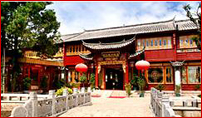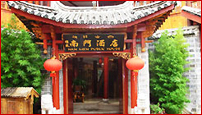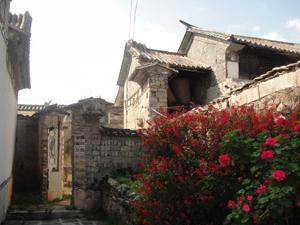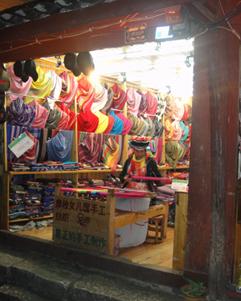| Lijiang Tour Package |

Wangfu Hotel, Lijiang    

Nanmen Hotel, Lijiang   
|
|
Lijiang
3 days 2 nights Tour Package
About Lijiang Local Tour
Lijiang is an old city with gorgeous surroundings
resting in northwest Yunnan, located on a plateau at an elevation of
8,530 feet. Tectonic movement, which took place over 65 million
years ago, created the Himalayas and gave rise to the Qinghai-Tibet
Plateau. In the southeastern part of this plateau and the
northwestern part of the Yunnan-Guizhou Plateau, meandering mountain
ranges tower into the sky and swift rivers roar in deep gorges,
presenting magnificent landforms over an area covering more than 77
thousand square miles. This area embodies the beauty of Lijiang
Prefecture.
The
Yulong Mountains are located where the Qinghai-Tibet and
Yunnan-Guizhou plateaus interlock, and together they form the peak
of the Yunling Mountains, the southern-most section of the Himalayan
Mountain range. Harboring a string of marine glaciers, the Yunlong
mountain range, extends unbroken for 21 miles, forming a "Jade
Dragon" dancing in clouds. Its silvery scales shining bright, the
dragon's head faces towards to the north, while its body rolls
south. The southernmost peak Shanzidou is 18 thousand feet in
altitude and is also known as the "jade pillar that props up the
sky."
B=breakfast L=lunch D=dinner
DEPARTURE: Daily
|
|
| |
TOUR ITINERARY |
 |
Tour
code:
GWAC-LJ-01 |
|
| DAY 01 |
You will fly to Lijiang, Yunnan
province in the southwest of China, and upon
arrival at the airport you’ll be met by your
English-speaking guide. Lijiang is a town that
is an enclave of ethnic minority cultures, and
the Naxi ethnic group is especially prevalent
here.

After your arrival we’ll start by a little walk
around the old town of Lijiang, which has a
history of over 800 years. The old town is made
up of three old districts that retain a special
character of Naxi and Han construction and Naxi
customs, arts and culture. It was a former
trading town and a stop for traders carrying
goods on the “Chama Road” trails. It was listed
as a UNESCO World Heritage Site in 1997
following an earthquake and reconstruction in
1996 that returned the city to a more ancient
look. The UNESCO description says: “The Old Town
of Lijiang, which is perfectly adapted to the
uneven topography of this key commercial and
strategic site, has retained a historic
townscape of high quality and authenticity."
We’ll then head to the nearby village/town of
Baisha, where you will have the opportunity to
get better acquainted with the Naxi people who
live there. Baisha Old Town is one of the oldest
towns in Lijiang. It is the earliest settlement
of the Naxi people and is the birthplace of "Tusi",
chief of the Mu clan. In the town there are many
ancient buildings built during the Ming Dynasty,
including Dabaoji Palace, Liuli Temple, and
Wenchang Palace. The well-known Baisha Frescoes
are located in Dabaoji Palace. Because of the
white sand on the ground, the town was named "Baisha",
which means "white sand". In the Naxi language,
it is called "bengshi". The architectural
complex is made up of two parts, folk residence
and cultural sites. The folk residence is called
"pengshizhi" which in the local language means "Baisha
Streets". The streets all go from south to
north. In the center of the old town there is a
square where three thoroughfares intersect.
Houses and small stores stand on the both sides
of these streets. A crystal clear stream winds
around all the houses flowing through the small
town from north to south.
The center of town features a beautiful
rendering of frescoes religious frescoes. The 44
pieces of Baisha frescos were drawn in the early
Ming Dynasty. Most of the paintings are about
religious stories of Taoism, Buddhism, and
Tibetan Buddhism. The murals embody the artistic
characteristics of the Naxi, Tibetan, Han and
Bai ethnic groups. Among them the paintings
about Kwan-yin and Sakyamuni are the most famous
ones. Now Baisha Frescos, also known as Lijing
Frescos have become precious data for the study
of China's history of arts and religions. We’ll
then return to Lijiang for a dinner of
traditional Yunnan cuisine.
After dinner, you’ll be treated to an evening of
music and dance at the Naxi Orchestral Show,
located at the Dongba Palace. This show presents
the splendid culture of the Naxi ethnic minority
group in the form of song and dance, and it’s
the perfect way to cap off your day.
|
|
3 or 4 star for common; 5 star for deluxe |
|
| DAY 02 |
Today you will have a free day
for yourself, and you can further explore the
Lijiang Old Town and the aspects of Naxi life
that it has to offer. The old town is made up of
three old districts that retain a special
character of Naxi and Han construction and Naxi
customs, arts and culture. It was a former
trading town and a stop for traders carrying
goods on the “Chama Road” trails. It was listed
as a UNESCO World Heritage Site in 1997
following an earthquake and reconstruction in
1996 that returned the city to a more ancient
look. The UNESCO description says: “The Old Town
of Lijiang, which is perfectly adapted to the
uneven topography of this key commercial and
strategic site, has retained a historic
townscape of high quality and authenticity. the aspects of Naxi life
that it has to offer. The old town is made up of
three old districts that retain a special
character of Naxi and Han construction and Naxi
customs, arts and culture. It was a former
trading town and a stop for traders carrying
goods on the “Chama Road” trails. It was listed
as a UNESCO World Heritage Site in 1997
following an earthquake and reconstruction in
1996 that returned the city to a more ancient
look. The UNESCO description says: “The Old Town
of Lijiang, which is perfectly adapted to the
uneven topography of this key commercial and
strategic site, has retained a historic
townscape of high quality and authenticity.
In the afternoon you might want to visit the
Wangfu Pagoda, which is located on top of Lion
Hill in a small park. The top of the hill
affords excellent views over Lijiang. When you
walk down from the hill you can come across the
Mu Chieftain’s Palace, which is the residence of
the former chieftain of the area.
You are also encouraged to try the varied
Chinese and western cuisines that are in the
city, as there is a delicious meal around almost
every corner.
|
|
3 or 4 star for common; 5 star for deluxe |
|
| DAY 03 |
After breakfast you will be
taken to the airport, and you will on to your
next destination.
|
|
|
|
|
Tour Inclusions:
1. Hotels with daily western
breakfasts;
2. Meals in accordance with
that listed on the itinerary.
3. professional local guide
& driver;
4. Private air-conditioned
car or van for transportation;
5. Admission of the first
gate.
6. Two bottles of mineral
water per day.
Tour exclusions:
1. Tip of the guide
2. Personal costs
|
|

